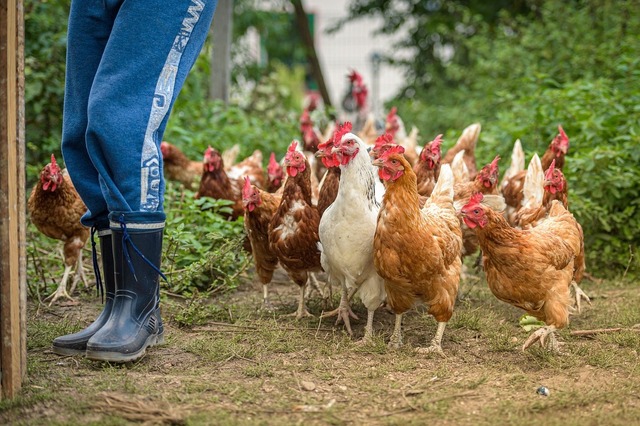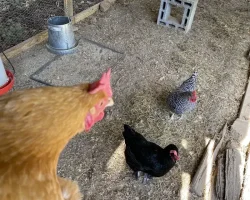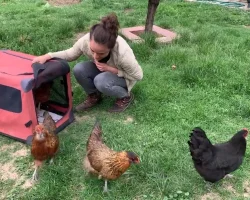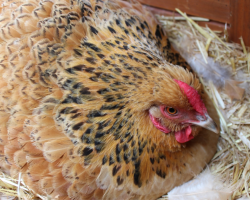So, you’ve gone and got yourself some chickens! Or perhaps you’re a little chicken-curious and wonder what it’s like. Before you make up your mind, ask yourself these questions to see if there’s anything you should give some extra thought. If you already have, and selected the best chicken breed, you’ve come to the right place. I’m about to teach you how to take care of chickens in 8 easy steps!
Routine Work
Whatever it is you set out to do, make sure it’s something you’re prepared to do regularly. Chickens thrive on routine, just like you do. Something like feeding them chicken feed and chicken grit might seem obvious, but other things like cleaning and checking your predator defense systems are equally important. If you feed them in the morning, make sure you (or someone in your household) can feed them every morning, around the same time. Automatic doors are a great solution for chickens who like routine, but have owners (like me) who like to sleep in on the weekends!
Daily chores
- Morning routine: Let your chickens out of their coop each morning. Check their food, grit, and water. Make sure everyone looks healthy and happy, and the fence is intact. If you have time, wait till mid-morning until your hens have all laid eggs and collect them immediately. This prevents your hens from becoming broody.
- Mid afternoon: If you like, you can offer your chickens a little treat.
- Evening routine: Collect any remaining eggs from the nesting boxes. Also check other places, like the run, just in case. Clear away any leftover food, and then shut the chickens back in their coop for the night to keep them safe from predators. Preferably, lock up your chickens at dusk but before dark.
Weekly chores
- Coop cleaning: Clean out the coop at least once a week. Scrape off perches and other surfaces, remove the old bedding, and replace it with fresh material. You can use things like wood shavings, straw, or shredded paper.
- Clean feeders and drinkers: Scrub them with hot water and soap to remove dirt and fatty, slimy residue. If your chickens are sick, disinfecting might also be a good idea. First clean thoroughly, let it dry completely, and disinfect with a poultry-safe disinfection agent.
- Health checks: Take a close look at your chickens every week. Check their feathers, legs, and eyes to make sure they look healthy.
Other chores
- Summer care: Make sure your chickens have plenty of shade and fresh water during hot weather.
- Winter care: In the winter, make sure the coop is dry and draft-free. You might need to add extra bedding to keep your chickens warm.
- Deworming: You’ll need to deworm your chickens monthly to keep them healthy. Verm-X or another chicken dewormer will do the trick.
- Powder against red mites: Spreading Diatomaceous Earth prevents red mites. Apply powder on your hens, as well as in the coop, nesting boxes, and dust bath.
- Vaccinations: Protect your chickens from disease by vaccinating them. Ask your local veterinarian for advise and help, especially the first time.
feeding time!
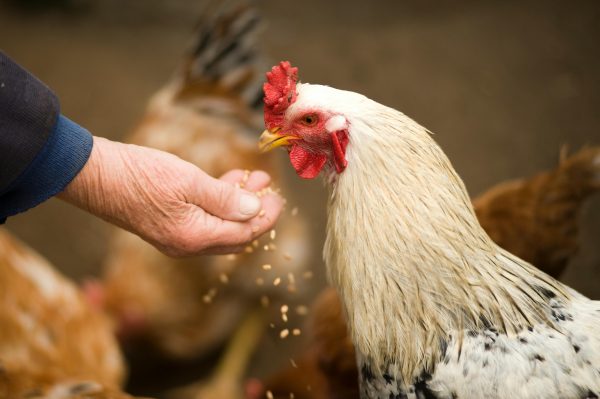
Let’s take a closer look at routine number one: Feeding time! Chickens want breakfast, or they get cranky. Don’t forget about an unlimited supply of fresh water as well. You don’t necessarily need to be up at the crowing of the rooster. Sometime after the sun rises and before the late morning is good, as long as there is a daily routine. Get them out into the morning air and give them a feeder full of healthy food!
In the mid-afternoon, you can give them a treat. Your chickens will love scraps from your kitchen, corn or a little extra commercial feed. Kitchen scraps can include rice, pasta, fruit and vegetables. This is the perfect time to tame your adult chickens as well! Talk to your chickens, give them the tasty treats, and watch them become your best friends.
What do they like extra much, then? Well, they go nuts for blueberries, and they love corn. Watermelon (in moderation) is another fan-favorite, and they really like grubs, if you have that “luxury”. Lift an old log and let them peck away!
Just make sure to avoid, mind you, raw beans, chocolate, avocado pits and skins, rhubarb and molded foods. They are deadly to chickens! They also shouldn’t be eating processed meat, cheese or white bread. It gives them stomach problems. Don’t make them a ham toastie for lunch, is what I’m saying, no matter how much they nag.
Be careful not to overdo it with treats! it is a little something extra, not a necessity. As a rule of thumb, their main food supply should be 90% highly nutritious chicken feed and chicken grit and only 10% treats. Chickens will usually regulate their eating, so as long as you keep feed readily available, the chickens will eat until they’re full.
Read other articles on this website to learn more about chicken grit and chicken feed.
A Deep Clean of your chicken coop
Every chicken house needs a good deep clean every once in a while! It is a lot of work if you have a lot of hens, so be resilient. Chickens don’t like being dirty and usually keep themselves fairly clean, but that’s difficult if their coop is a mess. Cleaning is not only important for smell and comfort but also for your chickens’ health. It prevents the growth of bacteria and algae.
Clean the coop, feeders, and drinkers at least weekly. In summer, cleaning more often is a good idea since bacteria grow faster in hot weather. Start by moving the hens to the run, scraping off perches and other surfaces, removing the old bedding, and replacing it with fresh material. You can use things like wood shavings, chopped straw, or shredded paper as bedding. Scrub feeders and drinkers with hot water and soap to remove dirt and slimy residue. If the water is too slimy for you, it’s too slimy for your chickens!
If your chickens are sick, or to prevent that, disinfection of the coop, feeders and drinkers can help. First clean thoroughly with hot water and soap, let it dry completely, disinfect with a poultry-safe disinfection agent (like hydrogen peroxide or other commercial disinfectants), rinse with water and let it dry again. Plastic chicken coops are easy to clean, especially with a electric high-pressure washer.
As opposed to your happy, fluffy (sometimes stinky) dog, your chickens might not enjoy having a bath as such. They do a pretty bang-up job of cleaning themselves. You’d usually only wash chickens if they’re show hens, and then only for upcoming shows. If all you’re doing is keeping backyard egg layers, you won’t need to shower them. Keep their chicken house, coop, and run nice and clean (and up to health standards), and the chickens will do the rest! Also, provide them with a dust bath, and top it up with red mite powder (like Diatomaceous Earth) to prevent these nasty little buggers.
health checks and chores
Weekly health checks are the key to happy, healthy hens that lay lots of eggs. Check all your chickens, one by one, for illnesses, injuries, or infections. Do they have any parasites? Do their feathers look healthy and clean? Are their chin flaps nice and red? Are they eating properly? Do they feel a healthy weight? Do they have any scrapes, scabs or bruises? Are there any abnormalities? Other chores that need to be done to keep your chickens healthy are deworming, powdering against mites, and vaccinating.
Deworm your chickens monthly by giving them Verm-X or another chicken dewormer. Give Verm-X by adding 1.5ml per bird to their daily drinking water ration or soak in bread. Repeat for three consecutive days each and every month. There are also types of chicken dewormer available that can be given as a pill or crumbled over the feed.
Powder against red mites with Diatomaceous Earth. Apply powder on your hens under the wings and on their backside, around the vent. Also apply it in the coop on all places where red mites might hide: cracks, nest boxes, perches, the floor, litter tray, etc. If you also top up the dust bath with powder, hens can treat themselves! Wear gloves and a dust mask to prevent skin irritations. You don’t want to become a red, hot, itchy mess yourself!
Protect your chickens from disease by vaccinating them. As a poultry specialist, I am a huge fan of vaccinations since you safely provoke and prepare the immune system for the real disease. Vaccinations are common practice in commercial poultry farms. Common diseases to vaccinate against are Marek’s Disease, Newcastle Disease, Fowlpox, and Infectious Bronchitis. Ask your local veterinarian for advise and help, especially the first time.
Click here to learn more about common backyard poultry diseases, prevention, and treatment
How to keep rats out of the chicken coop
If you haven’t guessed it, I’m referring to one of the most notorious threats to your yard: The rodent. You don’t like mouse traps? Well, think again – because you’re gonna like mice and rats even less once they cohabit with your poultry! They get attracted by spilled food and piles of hay, rubbish, and wood. So be sure to keep all that under check. Clean your yard, move piles of logs or other stuff away, and try to feed your chickens in the least messy way possible. Once the mice and rats get a whiff of your endless supply of chicken feed and settle in, it’s almost impossible to get them to leave.
If you have a cat that doesn’t eat chickens, they will be happy to help control the vermin population. That can be risky, though, if you have small chickens and the cat can’t help itself. There are mouse traps that catch rats and mice alive, and more deadly ones that kill them on impact. Nothing is foolproof to an amateur, though. It might turn out that the most efficient and economical thing is to hire an expert to control pests regularly. It sure was for me, anyway.
How to protect chickens from predators

Chickens are delicious fast food to predators. They are the equivalent of a juicy Happy Meal or Mc Chicken, so you will need to defend them against all kinds of creatures. Foxes live everywhere, badgers dig up your garden, wolverines are clever little skeevers who can open gates, and wolves are just plain scary, for anyone! Depending on where you live, you might want to read up on local wildlife and what to expect when trying to keep them out of your chicken house.
The basics in keeping your hens safe are to coop them up during the night and keep them in a run during the day. Always lock the door of the coop every night, and don’t forget to check corners and walls for anything climbable. Keep the fence in order. Is anything rusting? Anything loose? Is anything too climbable or rippable? Too much tall grass growing up into your electric fence?
Dig deep when you’re building the fence. One mistake can be that you only dig the poles down and leave the chicken wire above ground. That’s nothing to a badger. Another mistake might be to not anticipate attacks from the sky. Cover the run with chicken wire, or buy a covered run, to keep hawks away from your chickens. If your chickens are roaming free, hanging flashy repellant tape will help.
Scare predators away by adding a rooster to your flock, getting a guard dog, or using decoys like scarecrows. Make sure to move scarecrows around, otherwise predators get used to them. Also, there are deterrents you can buy that certain predators don’t like. Supposedly, the pee from bigger predators can scare away smaller ones. This might be alright if all the predators in your area are fox-size, but against wolves and bears, I’d recommend something else. A perimeter alarm and smart camera good for finding out if something is lurking around the yard, and sometimes a yard light will scare away the most shy night stalkers.
Click here for a comprehensive list of predators that like to eat chickens and different ways of dealing with them. If your chickens have been killed, here is a guide to help you determine what killed them.
Chicken Vacation
No, the chickens are not flying to Hawaii; it’s your vacation, from your chickens. Because what if there’s an important work trip, a destination wedding or a stay at the hospital? It’s going to happen at some point, you’re going to have to leave them for a bit. Make sure you have back-up when that time comes.
Do you know someone who is going to take care of them properly while you’re out of town? Do you know of any place where you can employ a person like that if you don’t? Check out local pet stores; they might have people who can check in on your feathery friends.
Before you leave, give the chickens and their living space a deep clean, so you don’t have to worry about that while you’re out gallivanting. Make sure there’s enough food left out in the feeder, enough snacks, and enough water. Most important is to write down and explain your routine and chores to your backup helper!
Seasonal Stuff
While all things related to raising chickens are important, there are a few things that have more or less priority depending on the season. Think about this before you get yourself chickens when it’s warm out. For example in summer, trimming the grass around the fence is on your weekly task list. If you have long, snowy winters, this is hardly going to be on your schedule while snow shoveling and insulating the coop definitely is. Same goes for everything, really.

- Spring is the time for deep cleaning and maintenance of the coop. It’s breeding season, so be prepared for broody hens.
- In Summer, provide plenty of fresh and cool water, as well as shade to protect your hens from the sun. Insect control (for example mites and flies) is now extra important.
- In Autumn the days start to get shorter and the weather gets colder and rainy. Manage mud with wood chips and put a tarp over the run to protect your chickens from the rain. Hens often start molting and stop laying during the molt, this is completely normal. Use artificial lighting if you want your hens to continue laying during autumn and winter.
- Winter is cold so insulate your coop, waterproof the roof, prevent draught, but keep a little ventilation. Make sure the water doesn’t freeze or replace it regularly. Shovel snow when needed. It’s normal for hens to eat more feed in winter, to maintain body temperature. Be extra careful of predators, they’re really hungry and desperate.
Let’s also answer a few frequently asked questions about the seasonal stuff.
What temperature is too cold for chickens?
The ideal temperature for a chicken laying eggs is between 60 – 77 °F (15 – 25 °C). However, that doesn’t mean your hens can’t handle more extreme temperatures. Chickens are covered in fluffy feathers and can keep themselves warm quite well, especially cold-hardy breeds. Adult chickens normally do not need heating, only baby chicks and young hens do. Only if the temperature drops below 10 °F (-10 °C) for more than a few days, you need to start thinking of installing a heater. But, be aware of the wind chill factor! Strong wind will make the hens feel colder (lower sensible temperature) than the thermometer indicates.
How to keep chickens warm in winter?
Setup your coop and run in a place with low wind, or place a sturdy windscreen or wall in front of it (not too close so it doesn’t block sunlight). Insulate the coop and put an extra layer of bedding material on the floor to make your chickens comfortable. Prevent draught and make sure the roof is waterproof. Don’t close the coop completely, your chickens need some ventilation! Give your hens extra feed, so their bodies can burn calories to stay warm.
How to keep the chickens water from freezing?
Whatever you do, don’t give your chickens hot water! Opposite to what you might expect, it freezes more quickly due to the Mpemba effect. What you can do is replace the water and drinkers often, add a floating object (like a pingpong ball) since movement slows freezing, place drinkers in a sunny location, and insulate the drinkers for example with bubble wrap. Last but not least, heated waterers for chickens are an absolute must in cold climates.
How to keep chickens laying eggs in winter?
Chickens are biologically wired to stop laying during the cold months to save energy. The ‘signal’ for their body to stop laying is a shorter day length. During autumn and winter, you can use artificial lighting to keep (artificial) day length at 15 hours, so your chickens continue to lay eggs. Add artificial lighting in the morning, since chickens need time to roost at dusk (instead of it suddenly being dark). An automatic timer for the light and automatic doors are ideal if you are not a morning person.
Make sure the whole coop and run are lighted equally and there are no dark areas, except in the nesting boxes. Normal light bulbs are fine, just make sure you can see well at chicken height.
How to keep chickens cool in summer?
Provide plenty of shade and cool, fresh water during hot weather. Avoid overcrowding, since hens produce heat. Although the number on your thermometer will not change, ventilation will help your chickens cool down since it decreases the temperature they feel (sensible temperature).
Final Thoughts
Just because chickens are relatively “easy” to care for doesn’t mean it’s something you can just “wing” it (pardon the pun). Be prepared, and be a master of routine. After all: Even though we like to break it sometimes to make life more exciting, it feels a lot better when you know your hens are comfortable.

